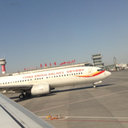Gastroprotective effects of arctigenin of Arctium lappa L. on a rat model of gastric ulcers.
Sleutelwoorden
Abstract
In the present study, the gastroprotective effects of arctigenin of Fructus Arctii were evaluated and the possible underlying mechanisms of action were elucidated. Arctigenin (high-performance liquid chromatography purity, >99.0%) was isolated and purified from the seeds of Arctium lappa L. The anti-ulcerogenic activity of arctigenin against ulcers induced by absolute ethanol and acetic acid was evaluated in a Sprague-Dawley rat model. In addition, the antioxidant activity was assessed by measuring malondialdehyde (MDA) levels in an ethanol-induced model and the anti-inflammatory effects were assessed by measuring five factors in an acetic acid-induced model. In the ethanol-induced model, arctigenin inhibited gastric lesions in a dose-dependent manner, by 53.04, 53.91 and 64.43% at doses of 0.05, 0.15 and 0.45 mg/kg, respectively. In addition, arctigenin reduced MDA (P<0.01) and increased superoxide dismutase (P<0.01) levels in serum when compared with the vehicle group. The lesion index induced by acetic acid was significantly inhibited by all doses of arctigenin (0.05, 0.15 and 0.45 mg/kg; P<0.01) in comparison to the vehicle group and in a dose-dependent manner. In addition, it was shown that the expression levels of tumor necrosis factor-α, interleukin-6 (IL-6), IL-10 and C-reactive protein were significantly decreased (P<0.05) in the arctigenin group compared with the vehicle group. Thus, the current study indicated that arctigenin exerted anti-ulcer activity, which may be associated with its reduction in oxidative and inflammatory damage. All the results indicate that arctigenin may be used as an effective therapeutic agent to prevent gastric ulcers.


